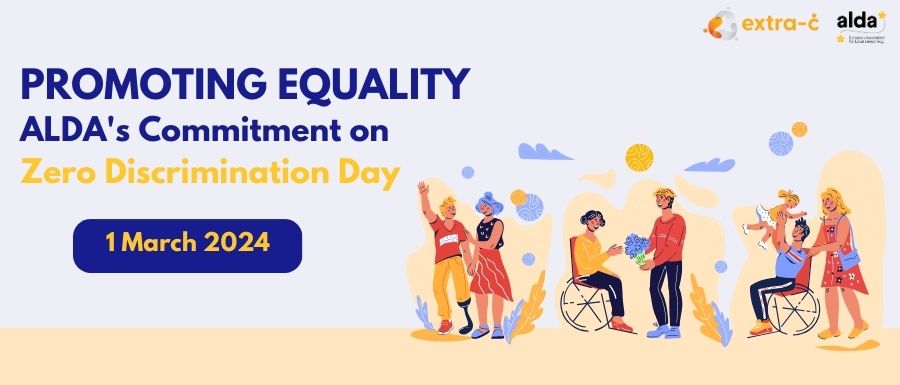Zero Discrimination Day holds a special place in ALDA’s calendar, observed annually on March 1. It draws attention to the importance of raising awareness and fostering inclusion, empathy, peace, and most importantly, creates a drive for transformative change. This day serves as an incitation for building a worldwide coalition committed to eradicating all manifestations of discrimination.
This year, ALDA took a significant step forward by introducing a comprehensive Gender Equality and Anti-discrimination Policy. This policy underscores our unwavering dedication to fostering diversity, equality, and inclusivity both within ALDA’s workplace and in our external engagements. To ensure the effective implementation of this policy, ALDA also established a dedicated Gender Equality & Anti-Discrimination Committee. This committee is entrusted with the responsibility of overseeing our initiatives towards equality while providing invaluable insights on pertinent issues.
Zero Discrimination Day serves as a significant moment for ALDA to contemplate the persistent obstacles faced by various communities, particularly individuals with disabilities, in their pursuit of justice and equality
Central to this struggle is the often overlooked reality of systemic discriminations that obstruct the fundamental democratic rights of persons with disabilities. In any democracy, political engagement stands as a basis, be it through active participation in elections, involvement in political parties, or staying informed through various media channels. The imperative to uphold these political rights resonates deeply as it questions the inclusivity and effectiveness of democratic systems, a concern that demands universal attention.
Individuals with disabilities represent just one of the many underrepresented groups who encounter structural and systematic discrimination, often relegated to the margins of society as passive recipients, deemed less valuable or even as “second-class citizens.” The impact of disability on political engagement is widely acknowledged as the “disability gap.”
In this context, the findings from the Extraordinary Citizens (EXTRA-C) project highlight a glaring disparity between theoretical democratic rights and their practical realisation across EU nations. EXTRA-C, an EU-funded initiative, aims to empower youths with disabilities to actively participate in democracy. By promoting inclusive participation and raising awareness, EXTRA-C is transforming communities into vibrant, diverse spaces where everyone has a voice.
Women with disabilities: Confronting intersectional discrimination in politics
According to the European Parliamentary Research Service in all EU countries, women with disabilities outnumber men with disabilities, comprising 26.1% and 21.8% respectively. Women with disabilities hail from diverse backgrounds and exhibit various types of impairments, including physical, psychosocial, and intellectual challenges. This diversity is further accentuated by intersecting identities such as ethnicity, religion, race, migration background, sexual orientation, gender identity, and age. Consequently, women with disabilities often contend with heightened levels of discrimination, particularly in the realm of politics, where they face an intersectional amalgamation of gender and disability discrimination, further complicating their full participation in political life.
Recognising the multifaceted challenges encountered by individuals with disabilities, the EXTRA-C, with ALDA as one of the project partners, has initiated a concerted effort to champion the political participation rights of persons with disabilities across five EU countries: France, Greece, Lithuania, Portugal, and Spain. The project is on a mission to promote inclusive participation and raise awareness at local, regional, national, and EU levels. Through a series of dynamic activities, the project aims to empower citizens and organisations, fostering inclusive participation at all levels of governance.
As we strive towards a more equitable and inclusive society, let us reaffirm our commitment to promoting equality and combating discrimination, not just on Zero Discrimination Day, but every day. Together, we can build a future where every individual is valued and empowered to realise their full potential.
If you would like to know more about the EXTRA-C project and its results, feel free to visit the project website.
